An Overview of Strategy Expectations
We've all been there. Our organization had a strategy, and it seemed pretty good - like it was the right way to go. We expected it to work. And then at some point, or more likely over a period of time, it fell over.
In other articles, we talk about the main reasons why strategies fail, but a key element of failure that escapes discussion is the management of expectations around how and why we thought our strategy implementation would actually work.
In the end, your strategy is only as good as your implementation - it needs to turn into a who, where, when, and how of reaching your desired objectives, which has to be communicated around the organization.
The implementation process means ensuring the people involved understand how they fit in, and about the benefits and desired outcomes of the new strategy, which will inevitably create a whole range of varying expectations.
Strategy Expectations
Expectations are a huge part of the implementation and execution of your strategy:
- Our expectations about the benefits of the new strategy determine our enthusiasm for making the changes and tough calls required to realize it.
If people don't have an appropriate understanding of the benefits, you risk not getting (or losing) support and buy-in from your team - either because people don't see the benefits, or because they are expecting things that won't materialize. Also, if your team has an appropriate set of expectations of the outcomes, you'll get much higher quality feedback from the people closest to the implementation as it happens, helping you to refine or correct your view of the benefits and the timelines.
- Our expectations about the "price" of changing the organization and its direction, e.g. the costs in time, effort, money, and opportunity (to mention a few), determine how and where we think we can make sacrifices on the way.
If your managers, team leaders, and anyone else who has responsibility for staff, money, or other resources, don't have clear expectations about what needs to be "spent" to make the necessary changes, then your implementation will stall as soon as there is any contention between current day-to-day business and working towards your new approach. It's crucial that this comes from the top - nothing will set bad expectations like seeing senior management clearly not committing their own resources to the strategy implementation.
- Our expectations of our own ability to follow through when the going gets tough to determine how well we think we'll handle the competing priorities, resourcing issues, clashing personalities, etc. that will arise.
Making important changes to how you do business is hard. Maybe what you're trying to achieve needs to be refined, maybe it's how you're doing it or the timelines you're expecting, or maybe something in the wider environment has changed - whatever they are, there will be challenges. If you and your team don't have appropriate expectations about managing the risks involved and making the hard decisions when they arise, you'll be far less prepared, and your ability to make good decisions quickly will be compromised.
We base decisions about implementing and executing our strategies on what we expect the journey and outcomes to look like.
When reality strikes, if our expectations are off the mark, that's when the focus is lost, enthusiasm and engagement wane and our organization quietly (or not so quietly) wanders away from the direction we set.
Implementing a new strategy (or just better implementing the one you already have) is an investment decision.
Just like the business cases that you've had to write or review for other business investments, there's a benefit and a cost, with a set of risks, issues, dependencies, and considerations, with an implementation path to make it happen (see our article on the strategy business case for more on this topic).
Maybe we don't think about or present our strategy in this way, but if you consider the elements, they're all there.
Think about your strategy as if you were making a case for implementing another business investment - how would you identify and manage expectations, and which things would cause you concern?
Here is a set of questions and statements about your strategy implementation - they are not exhaustive by any means, but they are indicative of the state of the expectations around your strategy implementation (I'm sure your experience would provide you with many others). To how many can you honestly say "yes"?
Expectations of the benefits
- When we formulated the strategy, the benefits were challenged from a practical "realization" perspective.
- All the managers responsible for the formulation, implementation, and execution of the strategy can say where it is taking us, in terms of key measurable targets or more intangible key outcomes (e.g. around cultural change) - and they would agree.
- Those same managers can say when these benefits will start to be realized - and again, they agree.
- I have a good idea whose expectations vary from mine, and whose are most likely to be sensitive to implementation issues.
Expectations of the costs
- Change takes effort - are we confident that we know where extra effort needs to be spent to make these changes?
- Does every manager responsible for the delivery of this effort know how they will provide it, and what the likely impact is on their existing work?
- Was any direct financial expenditure identified as part of the strategic change, and if so, are those managers whose budgets are affected explicitly on board with the plan?
- Do all the managers have a good idea where in their team and in their processes they will most likely find obstacles to planned changes?
Expectations of willingness and ability to follow through
- If you asked all the managers involved in delivering the strategy whether the changes and additional effort required were top of their priority list for the upcoming period, at the expense of some focus on day-to-day business (or any other proposed projects), would they say yes?
- Asking all the managers involved whether they think the leaders in the organization are willing to make tough calls and sacrifices within their own areas, would they say yes?
- If you asked all the managers involved whether, if the benefits were slower to materialize than originally projected, the leaders in the organization would be willing to continue to push towards those benefits, would they say yes?
For me, this last area is the hardest to think about. That's because it's what makes you really examine yourself, your team, and your organization.
It's about identifying whether the "organizational will" exists to implement and execute the strategy. In our experience, managing the impact of anything to which you answered "no" here will be critical to your success.
Expectation management as a key implementation tool
So, how did you do? Many of us find it hard to say "yes" to quite a few of these questions, for anywhere we've ever worked. And you know what, that's completely normal.
Anything to which you had to say "no" should be considered a source of risk for the success of your strategy. So, don't be afraid to address expectation management in the same way you would any other investment decision.
Talk about the risks and think about the critical success factors when you're putting together your "business case", and be prepared to actively manage expectations throughout your implementation.
Have you seen expectations play a different role in the success or failure of strategy implementation and execution? We're always keen to hear your thoughts.





.png)
.jpg)
.jpg)
%20(1)%20(1)%20(1)%20(1)%20(1).png)



